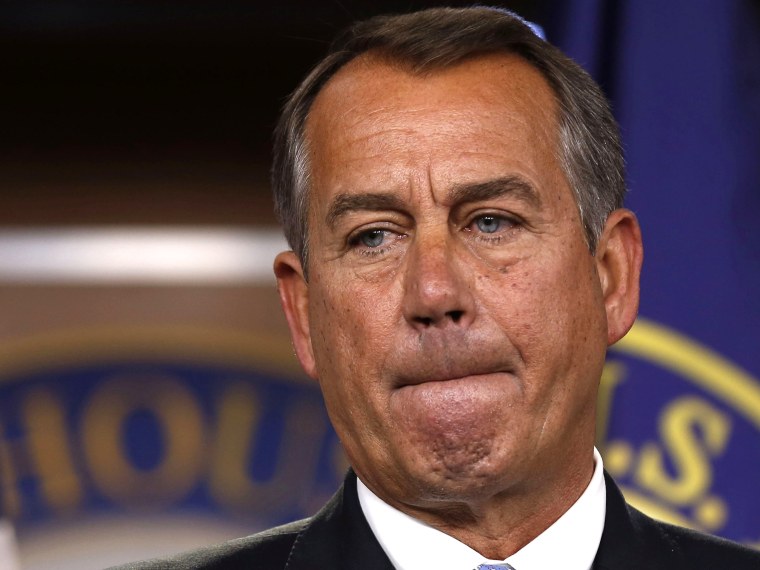It seems like Groundhog Day for John Boehner.
The House speaker's tone of optimism is gone after he again on Friday said there has been “no progress” on the looming fiscal cliff.
“This isn’t a progress report because there’s no progress to report,” Boehner said during a brief press conference on Capitol Hill. He accused the White House of having “wasted another week” in coming up with an agreement to avert a series of tax hikes and spending cuts that will slam the country at year's end unless Congress can hammer out a deal.
The Ohio Republican also suggested the president has a “deliberate strategy to slow walk our economy right to the edge of the fiscal cliff.”
This certainly isn't the first time we’ve heard such “no progress” declarations from Boehner.
On Nov. 8 he called raising taxes "unacceptable."Again on Nov. 29 he told reporters that he was disappointed that “no substantive progress” had been made regarding the fiscal cliff.
In September, Boehner said he was “not confident at all” the Congress could deal with the nation’s debt woes.
Back in 2010 during the first round of debt talks, Boehner also signaled he wouldn’t compromise with Obama on extending the Bush-era tax cuts. Congress eventually struck a deal, pushing the debt ceiling just past the 2012 elections.
On Friday, Democratic strategist Maria Cardona called such rhetoric “frustrating.” She added: “It’s got to be even more frustrating for American people who live outside the beltway and are sick of political theater, which is essentially what this is. Every day that goes by and [the Republicans] don’t honor the protection of the middle class tax cuts and the tax cuts for small businesses, the more their brand is tarnished.”
She said Obama ran his re-election on a clear message that the Bush tax cuts would remain in place for 98% of the population. Meanwhile, Cardona said, Boehner has offered little in the way of specifics.
“They’re not saying here’s how we want you to reform Medicare or Medicaid, what programs should be cut, certainly not the type of specifics” like Obama offered, said Cardona.
So what would true progress look like for Boehner? The House speaker has put forth his own proposal, but Democrats say they won’t accept a solution unless it includes tax rate increases for America’s wealthiest.
“Obviously the White House completely accepting the Republican proposal would be like Candy Land for them,” said Jamie Chandler, a political scientist at Hunter College. “But probably what’s [realistic and ] going to move them is concessions on entitlement reform.”
He added that while the president likely wouldn’t back off on tax increases for the wealthy, if he lowers the rate 1 to 2 % from what he’s pitching, the plan might “pick up speed.”
Chandler added that Boehner’s dilemma wasn’t necessarily based on conversations with the president but rather “conflict within the party,” among different groups, citing the Tea Party and anti-tax increase proponent Grover Norquist.
